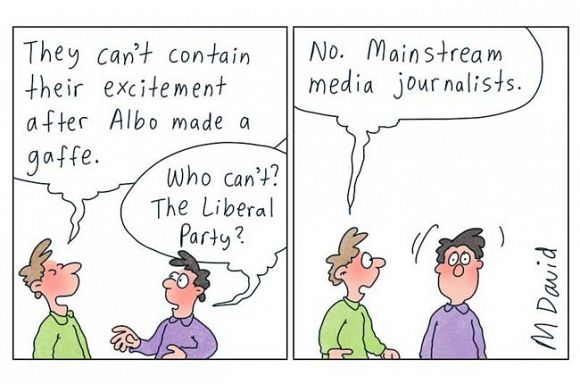Journalists need to improve the quality of their questions instead of chasing 'gotcha' moments with political leaders, writes Dr Tim Thornton.
AS MOST READERS will probably know, on the first day of the election campaign, Labor Leader Anthony Albanese was asked to specify the unemployment rate and the official cash rate, which are 4% are 0.1% respectively.
Albanese did not initially offer a figure for the cash rate and said the unemployment rate might be 5.4% then added he wasn’t sure of that figure. Such a response is unsurprising given that, up until now, we have not expected our politicians to be focused on memorising figures to such a precise degree.
This is as it should be. Indeed, encouraging our leaders to focus on this type of fine-grained memorisation is likely to crowd out the higher-level thinking that we really need from them.
When journalists then asked former Liberal Prime Minister John Howard to comment on Albanese’s supposed gaffe, he replied:
“Is that a serious question? Well, Anthony Albanese didn’t know the employment rate, so what?”
Howard subsequently changed his tune and fell dutifully into line, saying that Albanese should have known the figure. However, Howard’s initial response, given on the fly whilst campaigning in the seat of Hasluck, is presumably the more accurate representation of what he actually thinks.
What then can we reasonably expect from our leaders on all things economic?
First, it is necessary for leaders to be able to specify economic indicators in at least general terms. For example, knowing whether interest rates or unemployment are currently high, low or around the historic average is essential, even if they cannot specify that to the nearest percentage point with total accuracy.
Second, our leaders need to be able to understand and explain economic trends and what public policy can do in response. We are getting precious little of the latter at the moment and that is the more fundamental problem.
Why is the coverage of economic issues so puerile? Multiple factors are in play. Some journalists find it to be great sport and something that can generate much heat (though little light) with little effort on their part.
And rather obviously, the dominant Murdoch media is looking to harm non-L-NP politicians by any means it can get away with – fair or foul – though it must also be said that other media organisations like the ABC have also been surprisingly fixated on Albanese’s supposed gaffe. At a deeper level, part of the problem is limited levels of economic literacy in both the community and media.
How could things be done differently? Greater levels of economic education within and outside the Press Gallery would greatly help the quality of national economic conversation, which would in turn greatly strengthen Australia's democracy and society. However, little progress will be made on this front until we improve the relevance and quality of economics instruction.
Just as importantly, politicians should get on the front foot and simply tell us what they do know about the particular issue in question and what (if anything) they plan to do in response to it. Indeed, if they can’t do this it would constitute a “gotcha” moment of genuine significance.
We can see the beginnings of such a response in Greens Leader Adam Bandt’s recent fielding of a facile gotcha question at his recent National Press Club presentation. When asked what the current WPI (Wage Price Index) was, he responded, “Google it, mate” and argued that the election process should be a “contest of ideas” not a fact-checking exercise that puts people off politics. Notably, this front foot response has worked infinitely better than Albanese’s never-ending apology.
Journalists themselves could change the game by the quality of their questions. This could even go beyond a greater focus on why something is happening and what is to be done, to see if leaders can also demonstrate familiarity with any competing ideas or explanations about a particular issue.
This is reasonable given that all economics is very much a contest of ideas. If a politician cannot demonstrate awareness of a competing perspective, then it reveals that they have not made an informed choice and have simply been guided by their own ideological and/or material interests. Or they are simply parroting what somebody else told them.
Well, just imagine any of those things if you can.
Dr Tim Thornton is Director of School of Political Economy in Melbourne and a Senior Research Fellow with the Economics in Context Initiative at Boston University.
Related Articles
- The Albanese approach: How an unpopular plan has Labor on the verge of victory
- EDITORIAL:The Albanese approach: How an unpopular plan has Labor on the verge of victory
- Calls for Albanese to stand aside are unhelpful and futile
- 'It’s time' — for another Labor split
- Albanese much more than what the media portrays
 This work is licensed under a Creative Commons Attribution-NonCommercial-NoDerivs 3.0 Australia License
This work is licensed under a Creative Commons Attribution-NonCommercial-NoDerivs 3.0 Australia License
Support independent journalism Subscribe to IA.














